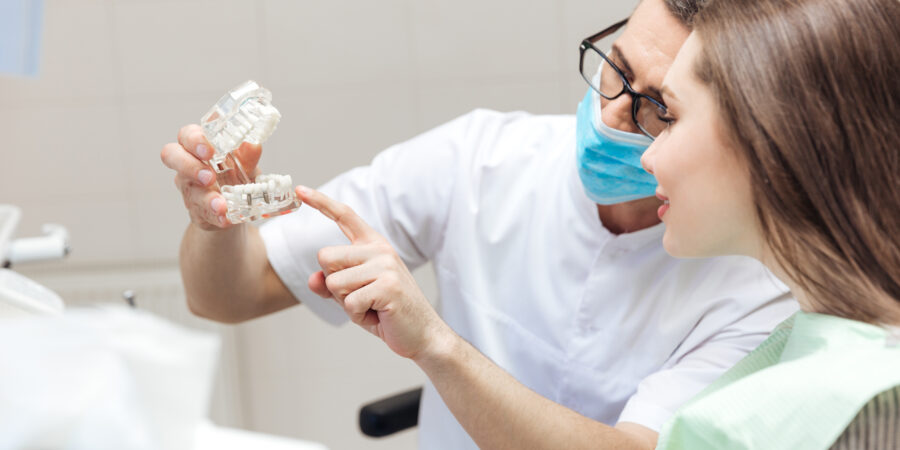How to File a Dental Injury Claim
Head and facial trauma sometimes occur in motor vehicle accidents or slips and falls. When an individual sustains a forceful blow to the face during an accident, dental injuries can be sustained and cause severe pain and disfigurement. Teeth are strong and resist damage. When a car accident breaks or knocks out a victim’s teeth, It’s likely that the injury can result to additional teeth damage. Some accidents that result in dental injuries might be attributed to the negligent conduct of another person or entity and form the basis of a viable personal injury claim. Below, we will discuss the best way to pursue a dental injury claim.
Dental Injury Claims Resulting from an Accident
If an an individual suffered dental injuries due to the negligence or careless misconduct of someone else, it’s important to speak with an experienced California accident attorney at JT Legal Group. You may be eligible to pursue compensation to cover the costs of replacing or repairing your teeth, dental crowns, veneers and other losses through an injury claim.
Dental Injury Causes in Accidents
Dental injuries can occur when your face and teeth sustain a forceful blow from an object during a collision or a fall. In a motor vehicle accident, there are multiple hazards both inside and outside of a vehicle that can cause these types of injuries. Pedalcyclists, pedestrians, and motorcyclists are particularly at risk of suffering these types of injuries because they have little to protect them from the forces released in a collision with a motor vehicle.
Motor vehicle occupants can also suffer dental trauma when they forcefully contact the following objects inside their vehicles:
- Dashboard
- Flying debris
- Steering wheel
- Seatbacks
- Cargo
- Doors
If a safety belt is defective or worn improperly, it could also cause injuries to a victim’s teeth and mouth during a car crash.
Types of Injuries to the Teeth and Mouth
Depending on the force of the blow suffered by an accident victim, resulting dental injuries might be direct or indirect. Direct injuries to the teeth happen when an object strikes or is struck by the victim’s head or mouth. Indirect injuries can also occur when a victim’s mouth is open and forcefully closes during the collision, causing the lower teeth to be crushed by the upper teeth. Because of the numerous nerves in the mouth, any type of dental injury can cause the victim to suffer extreme pain.
Dental injuries in motor vehicle accidents are more common when collisions occur at higher speeds such as on highways. They can also happen in rear-end collisions when the force of the collision causes the occupants of the front vehicle to strike their heads or teeth on the dashboard or steering wheel because of the violent back-and-forth movement. In these types of collisions, whiplash might also occur in addition to the damage to the teeth. The most common types of dental injuries in motor vehicle accidents are described below.
Avulsed Teeth
An avulsed tooth occurs when the force of the blow causes the tooth to be knocked out of its socket. If your tooth is knocked out during a car accident, you should avoid touching the root when you pick it up. Instead, carefully pick it up by its crown and place it in a baggie or container filled with milk, saline solution, or saliva. You must seek immediate medical attention following your accident to try to place the tooth back into its socket. If a tooth is not placed in its socket within two hours, it will likely not survive.
Luxated Teeth
Luxation is a dental injury in which a tooth is loosened but not knocked out. If you suffer a luxation, your tooth will be loose, and you will be able to move it forward and backward or sideways. A dentist will normally treat this type of injury by returning the tooth to its original position. The dentist will also likely examine the rest of your teeth to check for other injuries and damage.
Fractured Teeth
Tooth fractures are acute dental trauma that can happen in serious automobile collisions and require treatment to repair the damage. Three categories of dental fractures can occur in accidents, including Ellis I fractures, Ellis II fractures, and Ellis III fractures.
Dental fractures that are categorized as Ellis I involve fractures to the crown that penetrate the tooth enamel. The tooth will be left with roughened edges, but it will not have visible color changes or be tender.
Ellis II fractures involve fractures to the enamel through the dentin of the tooth. The damaged tooth will be tender to the touch and when exposed to the air. The yellow dentin layer might also be visible.
An Ellis III fracture is the most severe type of dental fracture and extends through the tooth’s enamel, dentin, and pulp. This type of injury is painful and leaves a visible bloody area in the middle of the tooth.
Soft-Tissue Injuries
You can also suffer injuries to the soft tissues of your mouth in addition to injuries to your teeth, including damage to your gums, tongue, or the inside of your cheeks. If you suffer soft-tissue injuries to your mouth, you should rinse and wash the area with antiseptic and water. If there is foreign debris, try to carefully remove it. You can control bleeding by applying pressure with gauze pads on the wounded area. If you can’t control the bleeding, go to the emergency department.
How Accident-Related Dental Injuries Are Treated
Treating dental injuries from car accidents can be expensive. Some of the types of treatment you might need can include the following:
- Emergency dental care
- Oral surgery
- Bridges, crowns, dentures, veneers, or implants
- Bone grafts
- Rehabilitation for damage to your jaw that prevents you from chewing or talking
While your dental insurance might cover some of these costs, you might be left with exorbitant bills. The damages you might recover from the at-fault party for your injuries will depend on the extent and severity of your injuries, your long-term treatment needs, whether you were forced to miss work because of your injuries, and your non-economic losses. A California accident attorney at JT Legal Group can examine your case and help you understand the types of damages that might be available through a claim.
Other Injuries
A collision that is severe enough to cause dental injuries will typically also involve other types of injuries. When you hit your face on a dashboard, steering wheel, or another object hard enough to cause dental injuries, you might also suffer other injuries, including the following:
- Whiplash
- Traumatic brain injuries
- Facial fractures
- Internal injuries
- Spinal cord injuries
All of these types of injuries might be compensable in an accident claim when another driver is at fault.
After your collision, your attorney will investigate what happened to determine whether the other motorist was liable. California is a fault state for collision claims. This means that the at-fault driver will be ultimately responsible for paying your damages out of their insurance coverage. However, the claims process can take months to resolve, so you might need to use your dental and/or medical coverage to pay for a portion of your expenses until you reach a settlement or recover a verdict award.
Types of Damages
Damages in an accident claim involving dental injuries will vary based on multiple factors. Some of the types of damages that might be recoverable include the following:
- Past/future medical and dental bills
- Past/future income losses
- Rehabilitation expenses
- Cosmetic dental surgery
- Property damage
- Pain and suffering
- Disfigurement/scarring
- Emotional trauma
- Other losses
In addition to compensatory damages, some cases might also involve punitive damages. These are damages that are awarded to punish at-fault drivers whose conduct was especially outrageous and are not available in most cases. However, if the other driver engaged in reckless, willful, or wanton behavior, punitive damages might be recoverable on top of your compensatory damages. Your lawyer will advise you about the types of damages that might be available in your case.
How a Lawyer Might Help
When you have suffered injuries in a motor vehicle collision or another type of injury accident because of the actions of someone else, you might be entitled to file a claim to recover compensation for your losses. A personal injury lawyer at JT Legal Group can offer the following types of help:
- Investigating what happened
- Determining liability
- Gathering evidence to support your claim
- Working with experts
- Negotiating with the insurance company
- Reaching a fair settlement
- Filing a lawsuit
- Fighting for you through trial if necessary
To learn more about your case and your rights, contact JT Legal Group for a free consultation today by calling us at (888) 529-3111.
Questions on your claim?
We can help – (855) 559-1225
At JT Legal Group, our 30+ years of combined experience allows us to diligently achieve settlements for our deserving clients. Our office is so confident we can win the best possible result for our clients, that we work on a contingency basis. This means we don’t get paid until we settle our client’s matter. Contact our team today for immediate support.
Your victory starts here.
Click to call us now!
[NOTE:] Attorney Advertising: Nothing posted on this blog is intended, nor should be construed, as legal advice. Blog postings and hosted comments are available for general educational purposes only and should not be used to assess a specific legal situation. Nor does any comment on a blog post create an attorney-client relationship. The presence of hyperlinks to other third-party websites does not imply that the firm endorses those websites, their contents, or the activities or views of their owners.
Media Contact: Jesamine De Leon
[email protected]
(855) 559-1225


